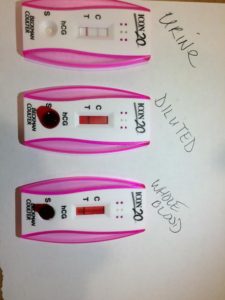Let’s face it, we’ve all done it. And, believe me when I tell you all the cool cats are doing it, too. Of course, I am referring to the use of whole blood to determine a woman’s pregnancy status in the Emergency Department using the urine pregnancy test strip. 
Did you know that the common ICON 25 Beckman-Coulter hCG tests are actually approved for both urine and serum? Don’t feel bad; I didn’t until I read a recent article. Whole blood, which is comprised of serum (54%), hematocrit (45%) and leukocytes/platelets (1%), was rumored to detect a woman’s pregnancy status. Now, we have research that confirms our suspicions and demonstrates that whole blood pregnancy testing performs quite excellently.
In a study published in 2012, whole blood pregnancy tests were found to be 96% sensitive, 100% specific with a negative predictive value of 98% and positive predictive value of 100%. Translation: Trust a positive test, it will not be wrong. Can it miss? Yes, it can; however, there’s a good chance that the urine test will be negative at that point, too (5 of 9 that were missed with whole blood testing of the studied 425 pregnancies were also negative on the urine testing—the other 4 of 9 did not undergo urine testing).
As troops on the front lines of medicine, we are presented often with little time to think or to act. We are adroit at putting puzzle pieces together, often with little information. This is our creed and such is our nature. It is during these critical cases, that the application of using whole blood pregnancy testing has its greatest application.
Post by: Raphael Brancato, DO (@DrRayFields )
